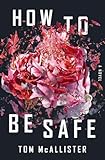1.
“Nobody else is here,” the elderly woman said into her phone. “It’s embarrassing!”
 She was the first one to arrive at my reading at the Philadelphia Library, a week after the release of my third novel, and two weeks after the pinnacle of my writing life, when that novel was praised in both The New Yorker and The Washington Post, two articles that I had assumed would create something like buzz around me or my writing. It was 6:58, and the reading started at 7:00.
She was the first one to arrive at my reading at the Philadelphia Library, a week after the release of my third novel, and two weeks after the pinnacle of my writing life, when that novel was praised in both The New Yorker and The Washington Post, two articles that I had assumed would create something like buzz around me or my writing. It was 6:58, and the reading started at 7:00.
Earlier that day, I had gotten messages from nine different friends, all saying they’d planned on attending but something had come up and they couldn’t make it. Each of their explanations was understandable—sick children, stuck at work, car troubles—but also it seemed cruel that every one of them would have an emergency on the same night. My wife was there, in the second row and I sent her a text from the front of the room: can we just leave? Will anyone notice?
I did not leave. I had promised to do an event, and the library had made space for me, and even if only one person was in the audience, I had a responsibility to deliver. But in those next two minutes—as I kept hoping for, say, a bus full of book critics to break down outside—I was thinking grim thoughts about the creative life.
2.
I have been very fortunate as a writer: since 2010, I have had three books picked up by three different publishers. I have gotten coverage in major publications and been invited to do events in many bookstores along the east coast. I made enough money on my first book contract to buy a pretty nice couch.
Before I ever published anything, I’d assumed that if I ever finished a book, there would be so much demand from family and friends alone that we’d have to go into a second printing before the release date. But I am here to tell you: most people in your family will never buy your book. Most of your friends won’t either.
I have a handful of friends and family members—people I consider close to me, people I see regularly—who have never come to any of my dozens of book events. I don’t know if they own any of my books because I haven’t asked, but I have a pretty good guess. After my first book came out, I would peruse friends’ bookshelves, trying to determine their organizational system (if it’s not alphabetical, then where is my book? Maybe they have some special hidden shelf for books they truly cherish?). On a few occasions, I called them out for not having it. This accomplished nothing, besides making both of us feel bad.
The point of this piece is not to shame those people or to complain about not getting enough support. It’s just to say: whatever you think it’s like after you publish a book, it’s actually harder than that.
3.
During the entire process of producing a book, the writer becomes a swirling vortex of neediness. First you’re begging for time to write, then you’re asking people to read and edit, then you’re querying agents, then you’re asking (oh god) for blurbs, then you’re contacting reviewers, then you’re emailing everyone you’ve ever met, then you’re posting on Facebook (again and again), and then you’re asking people to show up to some bookstore on a Wednesday night to listen to you read words at them. Later, you’ll ask them to write reviews on Amazon and Goodreads. Every day, you are making demands on people’s time and money. It’s terrible.
For most of these people, the only appealing aspect of the book is that your name is on the cover. Maybe they’re not readers. Maybe they like gritty mysteries and you’re writing literary fiction about a divorced Brooklyn couple. Maybe they like reading but don’t have time, due to career, kids, community activism, or something else. Relative to the amount of time and anxiety you devote to the project, you’re really not asking for much. But it’s important to remember: nobody in the world will ever care about your book as much as you do. Very few will ever understand exactly what it means to you.
People will like your Facebook statuses and retweet your tweets and they’ll even leave very nice comments. These likes and comments do not translate to sales. It’s the most passive way for anyone to show support. Over time, the novelty wears off. It’s exciting for non-writers to say they know an author, or for writer friends to remember back when you were starting out and working on your first, bad stories. Very little can sustain that enthusiasm over the six (or more) months during which you’re posting about the book.
I admit to having felt betrayed by my friends’ indifference, especially after the first book, but I remind myself that I do the same thing all the time. I have friends in bands that I haven’t seen live in years. I’ve never been to any friends’ improv shows. I skip a lot of readings, even when I know the readers. I have friends with books I haven’t bought or read. I have explicitly lied to colleagues about having read and enjoyed their books. The book industry is partly kept afloat by a shadow economy in which the main currency is bullshit.
4.
At a family party recently, a cousin asked why I didn’t bring copies of my newest book to sell. I don’t like the idea of showing up to family parties like a cotton candy vendor wandering from table to table looking for handouts. I’ve done this before (at my mom’s wedding, I sold two books, including one to the pastor), and it has always felt cheap and more than a little passive-aggressive. I’ve decided that the misery of haggling over prices with a cousin is not worth the benefit of one more sale. When the cousin said he wasn’t sure where to get the book, I told him he could probably order it with one click on his phone. I did not close the deal.
5.
The event I did at the Philly Library started late, as every reading does, as we hoped for that sudden influx of people. For the first time in my life, a (small) busload of people actually did show up. The library partners with a local retirement home, and so about a dozen people filled in the seats. Then a colleague arrived, followed by a writer friend. Then a friend from college, who I only see now at these events. Then a childhood friend, who always shows up even though he works long hours in the suburbs and has four young kids. Two people even bought books.
An hour earlier, I’d been drowning myself in self-pity, vowing to never put myself through this again. But then, in front of a modest crowd in the modest basement of a local library, I thought about how lucky I am to have any of these opportunities. I felt incredibly grateful to everyone who showed up, even the woman who made the upsetting phone call (she sat in the front row and listened intently and asked three questions). As always, I felt incredible gratitude to my wife, who has sat through so many more of these events than any person could ever be expected to endure. I felt fortunate to have friends who still keep showing up, sometimes making an hour commute to get there, even when all they’re getting out of it is fifteen minutes of me reading from a book, and maybe my signature. Some people couldn’t make it, but some did. That counts.
The next night I did a reading in my adopted hometown in New Jersey and eight people showed up. I gave them the best performance I could. What other option is there?
6.
Most of the writing life is disappointment. Publishing a book, which should be your most triumphant moment, is an anticlimax. There are no fireworks and no awards, no parades down Main Street. Many people close to you will disappoint you. But there are people who will come through, and they will keep coming through, and sometimes you’ll be surprised who falls into which category. I’ve learned to cherish those friends and family members who are always there, or even sometimes there. It takes real sacrifice on their part to support this weird thing I do. It takes money and time for them to seek the book out, to ask their local shops and libraries to carry it, to share it on social media.
People will read your book. Almost certainly not as many people as you wish. But sometimes a friend from high school or a former teacher will surprise you by showing up to a reading, or posting a review online. Sometimes a stranger will email you out of the blue and say they loved it, and in those moments it will feel like you’ve accomplished something impossible. It will feel better than you ever thought it could.
I don’t think there is any way to convince all the people in your life to buy your book, let alone care about it half as much as you do. Though their validation feels great, it’s important to remember that it’s also not the point. As a writer, you need to approach every project with the understanding that you’re doing this work for yourself, and everything that happens once it’s in the world is out of your control. Whatever project you’re working on now doesn’t derive value from your friends’ approval, but rather from the love and energy you pour into it. You can do the work, and you can keep showing up, and that’s all you’ve got. Most of the time, it’s all you need.



